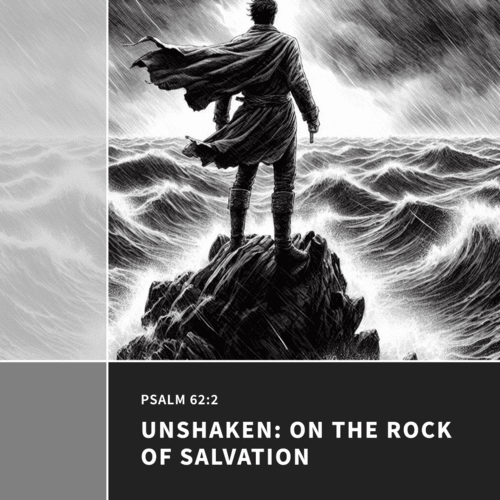What Can The Ethiopian Eunuch Teach Us About True Conversion?
CALVINISM’S ‘TULIP’ ON DISPLAY IN ACTS 8
Picture this: a dusty road stretching from Jerusalem to Gaza. A wealthy Ethiopian official sits in his chariot, scrolling through the prophet Isaiah. He’s reading about a suffering servant, but the words might as well be written in code—he wishes someone would explain the text to him. Then suddenly, a stranger appears, explains everything, and within hours this powerful man is baptised and “going on his way rejoicing.”
What just happened? It’s more than a simple conversion story—this is God’s blueprint for how He saves every soul.
THE DIVINE DRAMA UNFOLDS
The account in Acts 8:26-40 reveals five distinct steps that appear in every genuine conversion. Far from being random or coincidental, each element demonstrates salvation belongs entirely to the Lord.
Step 1: God Prepares the Heart and Mind
Before Philip ever appeared, God was already at work. The Ethiopian eunuch wasn’t just casually traveling—he’d journeyed hundreds of miles to worship in Jerusalem. He wasn’t just passing time—he was reading Scripture, specifically Isaiah 53. This wasn’t chance; it was divine preparation.
This illustrates what Reformed theology calls Total Depravity—not that we’re as evil as possible, but that sin affects every part of us, including our ability to understand spiritual truth. Yet God graciously prepares hearts before conversion. The eunuch’s spiritual hunger, his Scripture reading, even his physical location on that desert road—are all orchestrated by divine providence.
Consider our own stories. Wasn’t there a growing restlessness, an unexplained urge drawing us toward spiritual things? That wasn’t us working our way to God—that was God preparing our hearts for what was coming.
Step 2: God Sends a Human Servant
Here’s where the story gets fascinating. An angel commands Philip to head south on a desert road—not exactly prime real estate for evangelism. Then the Spirit specifically directs him to approach the chariot. Philip didn’t choose this mission; God orchestrated it all with perfect timing.
This demonstrates Unconditional Election—God’s choice isn’t based on the eunuch’s merit or Philip’s evangelistic strategy. God sovereignly orchestrated the divine appointment. The eunuch didn’t earn this encounter by reading Scripture. Philip didn’t stumble upon him by accident.
Yet notice how God uses human means. He could have spoken directly to the eunuch, but instead He sent Philip. Every true conversion involves a human messenger—a preacher, friend, family member, or author. God works through secondary causes while remaining completely sovereign over the process.
Step 3: Jesus Christ and His Cross Are Presented from Scripture
The Ethiopian eunuch asks a penetrating question: “How can I understand unless someone explains it to me?” Philip doesn’t start with theology or apologetics. He begins exactly where the eunuch is—Isaiah 53—and preaches Jesus.
This wasn’t random either. Isaiah 53 is the clearest Old Testament prophecy of Christ’s substitutionary death. “He was pierced for our transgressions, he was crushed for our iniquities.” Philip showed how this ancient prophecy found its fulfillment in Jesus, who died specifically for sinners like the eunuch.
This points to Limited Atonement—not that Christ’s death lacks power, but that it accomplishes exactly what it intended. Christ didn’t die hoping to save people; He died to actually save specific people. The eunuch was among those for whom Christ died, and the Spirit applied that work to his heart through Philip’s explanation.
Every genuine conversion centres on Christ’s cross. We can have religious experience, moral reform, or emotional responses, but without understanding Christ’s substitutionary death, there’s no true conversion.
Step 4: The Holy Spirit’s Work Produces Immediate Fruit
The Ethiopian eunuch’s response reveals the Spirit’s regenerating power. “Look, here is water. What can stand in the way of my being baptised?” No hesitation. No delay. No need for further convincing.
This demonstrates Irresistible Grace—when God truly calls someone, the response is certain. The eunuch couldn’t resist because he didn’t want to resist. His will had been changed. He now desired what God desired.
STEP 5: God Stays Invested In His People
Then comes the beautiful ending: Philip disappears—literally snatched away by the Spirit—but the Ethiopian eunuch “went on his way rejoicing.” His joy didn’t depend on Philip’s presence or ongoing support. He didn’t panic when his spiritual mentor vanished. He didn’t doubt his conversion or question what had happened. Instead, he continued his journey with supernatural joy that could only come from God’s completed work in his heart.
This demonstrates Perseverance of the Saints—not that we hold on to God through our own strength, but that He holds on to us through His unchanging grace. The eunuch’s lasting joy proves the authenticity of his conversion. False conversions often depend on external support, emotional highs, or favourable circumstances. But genuine salvation produces a joy and assurance that endures even when human helpers disappear, when feelings fade, or when trials come. The Ethiopian eunuch’s rejoicing wasn’t based on Philip’s teaching or his own emotional state—it was rooted in the unshakeable reality of what God had accomplished in his life. This is why true believers persevere: not because we’re stronger than other people, but because God’s work in us is permanent and His love for us is unchanging.
THE COMFORT OF DIVINE SOVEREIGNTY
Some find Reformed theology harsh or limiting. But look at the story again. The Ethiopian eunuch contributed nothing to his salvation except his sin. He couldn’t understand Scripture on his own. He didn’t seek out Philip. He didn’t orchestrate the timing. Yet he was saved completely, joyfully, permanently.
This is profoundly comforting. If salvation depended on our wisdom, works, or will, we’d have every reason to doubt. But since it depends entirely on God’s sovereign grace, we can rest secure. The same God who saved the Ethiopian eunuch has saved you—and He finishes what He starts.
The dusty road to Gaza reveals an eternal truth: salvation belongs to the Lord from beginning to end. Every true believer can trace the same divine fingerprints in their conversion story. It’s not about us working our way to God—it’s about God graciously working His way to us.
And that makes all the difference.
THE ETHIOPIAN EUNUCH: RELATED FAQs
What do contemporary scholars say about the Ethiopian Eunuch’s conversion? John MacArthur emphasises the eunuch’s inability to understand Isaiah 53 despite his education and religious devotion perfectly illustrates humanity’s spiritual blindness apart from divine illumination. RC Sproul frequently cited this passage to show how God’s sovereignty and human responsibility work together—Philip was responsible to preach, but only God could open the eunuch’s heart to understand. John Piper notes the eunuch’s immediate joy and obedience demonstrate true conversion always produces what he calls “Christian hedonism”—finding supreme satisfaction in God. Sinclair Ferguson highlights how this account shows regeneration precedes faith, as the eunuch’s understanding came through the Spirit’s work, not human effort.
- Are there other biblical conversion stories that display all five points of TULIP as clearly? Indeed, the demon-possessed man in Mark 5:1-20 provides another perfect example: his total depravity was evident in his uncontrolled, destructive state; Jesus specifically sought him out (unconditional election); Christ’s power was applied effectually to him alone among the demoniacs (limited atonement); he couldn’t resist Jesus’ liberating command (irresistible grace); and he persevered by becoming a faithful witness despite being told to leave Jesus and return home. Paul’s Damascus Road conversion in Acts 9 similarly displays all five points, from his active rebellion against Christ (total depravity) to his lifelong ministry despite enormous persecution (perseverance). Lydia’s conversion in Acts 16:14 explicitly states “the Lord opened her heart,” showing divine initiative overcoming human inability.
- Why was the Ethiopian reading Isaiah 53 specifically—was this coincidental? Nothing in this account was coincidental; Isaiah 53 is the most explicit Old Testament prophecy of Christ’s substitutionary atonement, making it the perfect text for gospel presentation. The eunuch was likely reading through the entire scroll of Isaiah during his long journey home, but God’s providence placed him at precisely this chapter when Philip arrived. Some scholars suggest he may have been drawn to this passage because, as a eunuch, he would have identified with the “suffering servant” theme of rejection and exclusion. Reformed theologians see this as a beautiful example of how God prepares not just hearts, but circumstances, ensuring His elect encounter exactly the right biblical text at exactly the right moment.
What’s the significance of the eunuch being from Ethiopia in terms of God’s sovereign election? The Ethiopian’s nationality demonstrates God’s election transcends ethnic, geographical, and social boundaries—here was an African court official being grafted into God’s covenant people. This fulfilled Isaiah’s prophecy that eunuchs would have “a name better than sons and daughters” in God’s house (Isaiah 56:4-5), showing God’s predetermined plan to include the excluded. His high social position yet spiritual need illustrates that election isn’t based on human status, education, or religious effort. Reformed scholars note his journey to Jerusalem shows God can draw His elect from the ends of the earth, literally fulfilling the promise that people from every tribe and nation will be saved. This conversion also prefigures the Gentile mission, demonstrating the gospel’s power extends far beyond Jerusalem’s borders.
- How does Philip’s sudden disappearance after the baptism support Reformed theology? Philip’s miraculous removal by the Spirit demonstrates human instrumentality, while necessary, is never ultimate in conversion—God alone saves and sustains His people. The eunuch’s continued rejoicing despite losing his spiritual mentor proves true conversion doesn’t depend on ongoing human discipleship or emotional support. This supports the Reformed doctrine that salvation is monergistic (God’s work alone) rather than synergistic (cooperation between God and man). Reformed theologians see this as evidence the Holy Spirit’s regenerating work is complete and permanent—the eunuch didn’t need Philip to maintain his faith because God Himself was now sustaining him. The account shows that while God uses means (Philip) to bring people to faith, He can also work independently of those means to preserve and grow His people.
- Why didn’t the eunuch ask theological questions or struggle with doubts after his conversion? The absence of theological wrestling or emotional doubt demonstrates the immediacy and completeness of regeneration—when God grants faith, it comes with accompanying understanding and assurance. Reformed theology teaches true conversion includes both intellectual illumination (understanding Christ’s work) and volitional transformation (desiring to obey), both of which were instantly present in the eunuch. His immediate request for baptism shows genuine faith naturally produces a desire for obedience without internal conflict or hesitation. Contemporary scholars like Michael Horton note this reflects the difference between human decision and divine regeneration—the latter produces wholehearted, joyful response rather than reluctant compliance. The eunuch’s story illustrates what happens when God’s irresistible grace encounters a prepared heart: instant, complete, lasting transformation.
How does this account address the common objection that Calvinism makes evangelism unnecessary? The Ethiopian eunuch’s conversion actually demonstrates why Reformed theology intensifies rather than diminishes evangelistic urgency—God’s sovereign decree includes both the end (salvation) and the means (gospel preaching). Philip’s immediate obedience to the angel’s command shows human responsibility remains fully intact within divine sovereignty; God commands evangelism precisely because it’s His chosen method for reaching the elect. The account proves God’s predestination doesn’t eliminate the need for human messengers but guarantees their ultimate success when faithfully proclaiming truth to the right people at the right time. Reformed evangelism is actually more confident because it’s grounded in the certainty that God’s Word will accomplish its purpose, not in the uncertain hope that human persuasion might work. This story encourages bold evangelism because it shows that when God opens a heart, the gospel message will be irresistibly effective.
THE ETHIOPIAN EUNUCH: OUR RELATED POSTS
Editor's Pick

Should We Stop Using Male Pronouns for God? Why Do We Say No?
A friend of ours arrived eagerly at his first theology class in seminary. But he quickly discovered something troubling: the [...]

Did Old Testament Law Force Women to Marry their Rapists?
**Editor’s Note: This post is part of our series, ‘Satan’s Lies: Common Deceptions in the Church Today’… Viral misinformation abounds [...]

From Danvers To Nashville: Two Statements, One Biblical Vision
30 years separate the Danvers Statement on Biblical Manhood and Womanhood (1987) and the Nashville Statement on Human Sexuality (2017). [...]

The Nashville Statement: Why Affirm It Despite Media Backlash?
WHY DO REFORMED CHRISTIANS STAND BY THIS STATEMENT ON MARRIAGE AND GENDER? When the Nashville Statement was released in 2017, [...]

Who Is Belial? Solving The 2 Corinthians 6:15 Mystery
Belial: This name from the pages of Scripture chills the soul. Who is this mysterious figure Paul invokes in 2 [...]

Celibacy Or Castration: What Jesus Really Means in Matthew 19:12
One of Scripture's most shocking misinterpretations led theologian Origen to castrate himself in the third century. His tragic mistake? Taking [...]

Philippians 4:13: Did Paul Really Mean We Can Do ALL Things?
"I can do all things through Christ who strengthens me." It's on gym walls, graduation cards, and motivational posters everywhere. [...]

The Ordinary Means of Grace: Why Are They Indispensable?
ORDINARY MEANS FOR EXTRAORDINARY TRANSFORMATION What if God's most powerful work in believers' lives happens through the most ordinary activities? [...]

Is the Bible God’s Word? Or Does It Only Contain God’s Word?
The authority of Scripture stands at the crossroads of modern Christianity. While some argue the Bible merely contains God’s Word [...]

Will We Remember This Life in Heaven? What Isaiah 65:17 Means
"Will I remember my spouse in heaven? My children? Will the joy we shared on earth matter in eternity?" These [...]
SUPPORT US:
Feel the Holy Spirit's gentle nudge to partner with us?
Donate Online:
Account Name: TRUTHS TO DIE FOR FOUNDATION
Account Number: 10243565459
Bank IFSC: IDFB0043391
Bank Name: IDFC FIRST BANK






